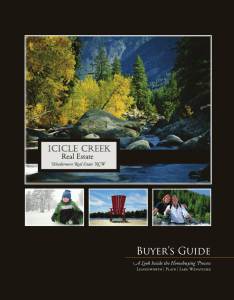Leavenworth and Lake Wenatchee – Be Bear Aware
Lake Wenatchee and Leavenworth residents need to be extra careful about black bears this fall according to a recent article in the Wenatchee World. More bears are being seen in the local area this year and it appears it is due to a lack of huckleberries in the mountains.
Each summer in the Cascades, bears go through a period of hyperphagia starting in August and September. Bears are trying to eat as much as possible to store up fat and energy for the upcoming winters hibernation. In some parts of the world, bears get their nutrients from fish, but in the Cascades huckleberries and blueberries (we have 7 types of vaccinium in the Northwest) provide much of these nutrients. It appears that a hard frost in the spring damaged this year’s berry crop.
Without berries to feed them, bears have to get their food someplace else. This often means more contact with humans. This leads to bears in garbage cans, bears in orchards, bears at birdfeeders, or even bears in houses! This summer we have lots of reports of bears near Lake Wenatchee and bears in neighborhoods near Coles Corner.
“Don’t feed the bears – it’s been said many times before, but that’s still the most important advice we can offer,” said Capt. Bill Hebner, who heads WDFW’s regional enforcement activity in northern Puget Sound. “Most bear problems begin with people feeding them, either intentionally or unintentionally.”
This fall residents and visitors to Leavenworth and Lake Wenatchee need to be more vigilant of bears for their safety and ours. You will probably see bears on the highway – this summer Allyson stopped for a cub on Highway 2 in Tumwater Canyon and I saw one near Nason Creek on Highway 207. You may see bears on the golf course. Please think about food sources at and around your house or cabin. Don’t leave garbage cans out for the bears to get into.
Short bit of vulgarity in this video – mute if you are likely to be offended.
Black Bears On Deck In Springtime Alaska – video powered by Metacafe
Washington State Department of Fish and Wildlife Offers these tips for living with bears:
Never intentionally feed bears or other wild animals.
Keep garbage cans in a garage or another secure area until collection day.
Remove pet food from areas accessible to wildlife.
Thoroughly clean barbecue grills after each use.
Take down birdfeeders until later in summer.
When camping, keep a clean campsite by thoroughly cleaning all cooking utensils after use and sealing uneaten food in airtight containers stored in bear-proof canisters away from sleeping areas.
In the event of an actual encounter with a bear, WDFW offers the following advice:
Don’t run.
Pick up small children
Stand tall, wave your arms above your head and shout.
Do not approach the animal and be sure to leave it an escape route.
Try to get upwind of the bear so that it can identify you as a human and leave the area.
WDFW encourages those who have a dangerous encounter with wildlife to call the Wildlife Hotline at 1-800-477-6224.
More information on living with black bears is available on WDFW’s website at http://wdfw.wa.gov/wlm/game/blkbear/blkbear.htm.


